Startup Naming Trends (Domains,Length,Words Count,Suffixes,Prefixes)
Naming a startup can be a challenging task. It would be better if you already knew what other startups currently do and how they chose a catchy name.
I analyzed more than 2000 startup names and their domains to reach some conclusions based on real data. To be precise, I used a random sample of 2127 startups mainly from the USA, Canada, and Uk.
I pulled the data from various resources such as ycombinator.com/companies/, 500.co/startups. I would say that the vast majority of the sample are startups funded by Ycombinator or 500 Startups.
Here is what i covered with my analysis:
Best tlds (Top-Level Domains) For Startups
How Many Words Should A Startup Name/Domain Have
Common Suffixes and Prefixes For A Domain
Ideal Length For Startup Names And Domains
Hyphen or Not In The Domain Name
**Get a free domain for 1 year and quality website hosting from Hostinger.com (affiliate link). Read my full review here.
Best TLDs (Top-Level Domains) For Startups
.com is by far the number 1 domain extension for the startups. The surprising result is what happens after that. Top-level domains such as .ai, .co and .io seem better alternatives than more well-known TLDs such as .net or .org.
I would like to mention that those 2 extensions (.ai, .io) are tied related to some popular technology concepts. .ai can be considered as artificial intelligence and .io as input/output although these are not the original meanings. You can read more in these 2 previous posts: .ai Domain (Meaning, Price, Popularity, Use Cases), .io Domain (Meaning, Price, Popularity, Use Cases)
We can consider .co as a company or corporation abbreviation although this is not the original meaning of that extension. If you are interested you can read more here: .co Domain (Meaning, Price, Popularity, Use Cases)
Let’s observe the detailed results in that chart:

| TLD | Percentage (%) | Number of Startups |
| .com | 80.3 | 1709 |
| .io | 6.2 | 132 |
| .co | 5.1 | 109 |
| .ai | 1.6 | 35 |
| .org | 1.2 | 26 |
| .me | 0.8 | 18 |
| .net | 0.5 | 10 |
| .us | 0.3 | 7 |
| .ca | 0.3 | 6 |
| others | 3.7 | 75 |
**Get a free domain for 1 year and quality website hosting from Hostinger.com (affiliate link). Read my full review here.
As I mentioned .com is by far the number one choice and we can say that is still the king for top-level domains even today. 8 out of 10 (80,3%) startups choose a .com for their domain.
What I didn’t expect is that the .io domain is the number 2 choice for a startup! 132 companies out of 2127 (6.2%) trust a .io domain for promoting their brand, product, or service. It is true that the big majority of the companies in this sample are tech-oriented and they are open to exploring new cool TLDs.
Here are some .io startup domains that stand out from the sample:
fiix.io provides an affordable, convenient on-demand automotive repair service.
eden.io covers all needs of the workplace – from office cleaning and handymen to IT support and office moves
flyer.io is a commercial realestate marketing software.
opendoor.io is a family style shared living in the Bay Area & Portland.
Very close to .io in the third position we see the .co domain. 109 out of 2127 (5.1%) startups chose a .co domain. This domain received big attention when at some point Godaddy (the biggest domain registrar) promoted it heavily. The underline meaning of “corporation”, “company” or “commerce” helped in that direction.
Here are some examples with a .co domain:
grove.co delivers healthy and sustainable home essentials.
human.co helps you understand your daily activity.
statsbot.co is a data platform that serves every department and every person’s data needs.
.ai comes fourth in the startup preferences with 35 (1.6%) companies out of 2127 choosing a .ai domain. Artificial Intelligence is a trending section and my assumption is that more and more startups will use this domain.
Here are some .ai domains i like:
nova.ai puts the power of AI to work for you, enabling a more continuous and more productive sales process.
supply.ai helping retailers inspire loyalty, improve trust and drive efficiency on a single platform.
trueface.ai is a face recognition company.
The real surprising fact is that only 10 out of 2127 (0.5%) startups use a .net domain! For decades .net was the second option after a .com domain. In the last years, this historical TLD is on the decline, especially amongst hi-tech startups. The rise of new extensions didn’t affect .com dominance but they got market size from .net for sure.
The “others” TLDs in the chart include: .app, .info , .co.uk, .ly, .am , .tech, .tven, .camera, .tv, .vu, .aero, .live, .ng, .health, .fm, .se, .chat, .is, .mobi, .bio, .si , .st, .tt, . space, .systems, .fit, .gg, .earth, .email, .ma, .la, .work, .academy, .do, .rs, .cash, .school, .solutions, .fun, .fi, .network, .qa, .am, .travel, .tax, .credit, .codes, .media, .it.
Real Words vs Invented
Do the startups use real words for their names/domains or are they trying to find a unique, creative, and invented word? From the data, we see that 1494 startups (70%) use a real word or a combination of real words.
A significant percentage (30% – 633 companies) use a cool, invented word that we can not find in a dictionary.
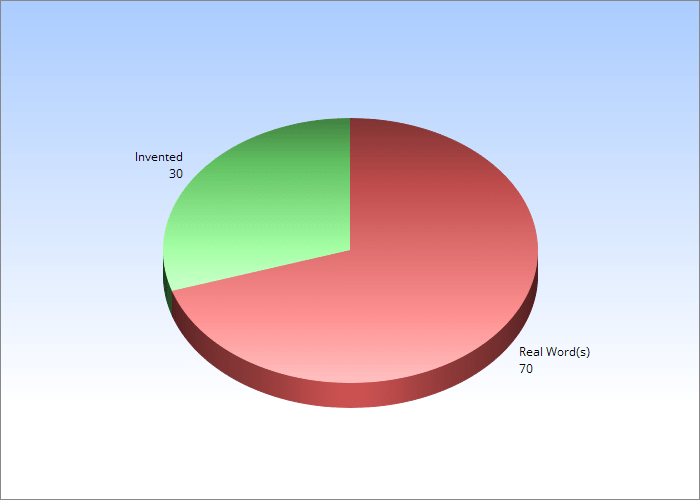
Let’s check some examples from both areas. We will start with startup names with real words:
anyroad.com is Experience Relationship Management (ERM) platform for big brands.
abacus.com is an expense management solution.
codecombat.com is a game-based education program that helps kids to learn to code.
Let’s check some invented and brandable names:
hykso.com is a tracker for hands movement, especially for athletes. The word might comes from “Hyksos: dynasty of Palestinian origin that ruled northern Egypt as the 15th dynasty”
jopwell.com is a career/human resources platform. They probably replaced “b” with “p” from the word “job”.
cleanify.com is an online marketplace for cleaning services. They adding the suffix -ify after the “clean”.
recurly.com makes it easier for businesses to use a subscription model for their services. The word is a smart modification of recurring.
But how startup owners come up with invented and unique names? I noticed some patterns:
1.)They add some suffixes to real words: Estately added -ly to a real word.
2.) They change just a letter from an original word: Estimote switched “a” with “o” from the word “estimate”.
3.) They combine 2 real words but they drop some letters from the first or the second word: Givesurance comes from “give” and “insurance” but the “in” part was dropped.
4.) They use a short name that you can pronounce easily but it doesn’t have a meaning. This is how “Weebly” was born. In that case, you need to experiment a lot with possible combinations before you reach on something that makes sense.
The trick here is to find an invented word that you can pronounce only in one way and it doesn’t have any underline disrespectful meaning.
How Many Words Should A Startup Name/Domain Have
What is the ideal number of words a startup name and domain should have? I created a chart for the names and one for the domains. Sometimes an exact match domain for a startup name is not available and the companies add a prefix such as a get, join etc. That’s why there is some slight difference in the data that doesn’t affect the big picture.
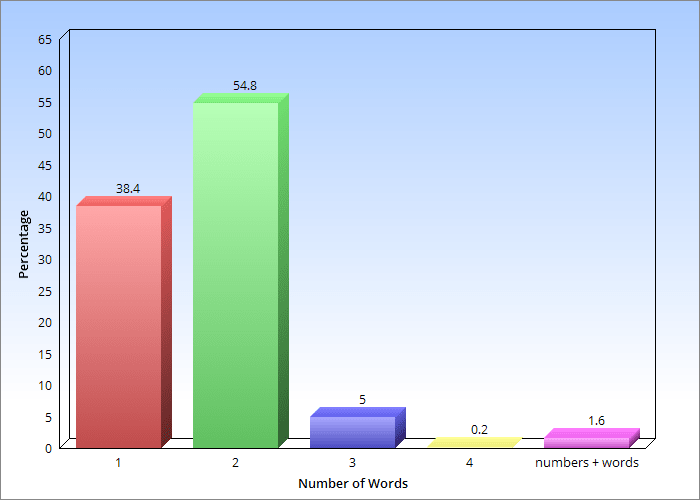
| Number of Words | Percentage | Number Of Startups |
| 1 | 38.4% | 817 |
| 2 | 54.8% | 1166 |
| 3 | 5% | 105 |
| 4 | 0.2% | 5 |
| Numbers + Words | 1.6% | 33 |
93,2% (1983 of 2127) of startup names contain a maximum of 2 words! The most common choice is 2 words names (54.8% -1166/2127). Including numbers in the name doesn’t seem a viable option since only 33 startups (1.6%) use that approach.
Here are some examples of 1 word and 2 words names:
Remind is a communication platform that helps students to succeed. Simple is a fintech company that provides online accounts and debit cards. Stripe makes it easier for companies to accept and receive payments. Docker helps developers to create quality apps.
Redbooth is a project management software that more than 6000 companies use. DroneBase offers drone services and provides valuable data to customers. EquipmentShare helps contractors by providing advanced tracking solutions.
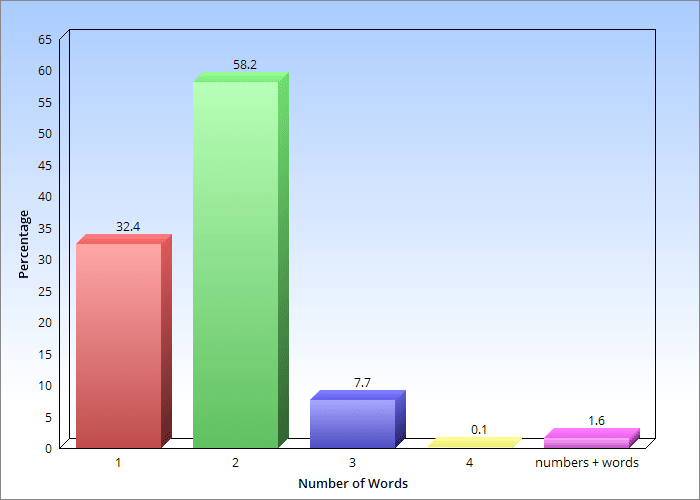
| Number of Words | Percentage | Number Of Startups |
| 1 | 32.4% | 689 |
| 2 | 58.2% | 1238 |
| 3 | 7.7% | 163 |
| 4 | 0.1% | 3 |
| Numbers + Words | 1.6% | 34 |
1238 startups (or 58.2%) use a 2-word domain and 689 startups (or 32.4%) use a 1-word domain. 90.6% of startups use a maximum of 2 words for their domains!
For Domains, startups sometimes need to use 2 words even if their name is just one word. It happens that the 1-word domain is not available or it is too expensive. They tend to use some prefix like get or join or some suffix like HQ or app.
Some good examples are: Balloon is an insight mobility platform that uses the domain getballoon.com. Hover helps developers to build android apps and the domain they use is usehover.com. Yumi delivers quality organic food for babies and toddlers. They use the domain helloyumi.com.
Common Suffixes and Prefixes For A Domain
It seems that the 3 most popular prefixes or suffixes for startup domains are: get, app, or go. As we already said many times a domain name doesn’t fit 100% with the startup original name.
Let’s see with numbers what companies do when they can’t get an exact match domain for their brand. I isolated 230 companies from the original sample of 2127 startups. These 230 companies use a prefix or suffix for their domains so you will see a breakdown by the percentage below.
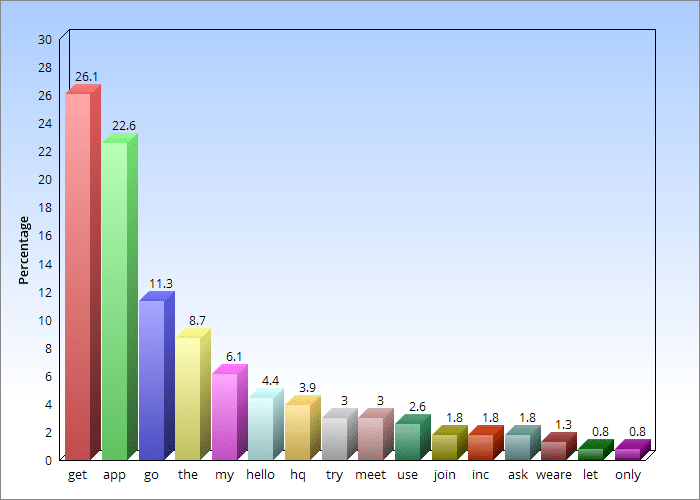
| Prefix Or Suffix | Percentage | Number Of Startups |
| get | 26.1 | 60 |
| app | 22.6 | 52 |
| go | 11.3 | 26 |
| the | 8.7 | 20 |
| my | 6.1 | 14 |
| hello | 4.4 | 10 |
| hq | 3.9 | 9 |
| try | 3 | 7 |
| meet | 3 | 7 |
| use | 2.6 | 6 |
| join | 1.8 | 4 |
| inc | 1.8 | 4 |
| ask | 1.8 | 4 |
| weare | 1.3 | 3 |
| let | 0.8 | 2 |
| only | 0.8 | 2 |
60 startups (26.1%) have chosen “get” as a prefix, 54 (22.6%) have chosen “app” as a domain suffix, 26 (11.35%) have chosen “go” as prefix and 20 have chosen “the”.
In my opinion, the rise of the “app” as a suffix is a result of explosive growth in terms of mobile apps in the last years. Gradually companies turn their attention to what we call “mobile-first”. Most of the users interact mostly with their smartphone comparing with other forms of digital devices such as laptops or desktop pcs.
Let’s see some examples:
Curtsy is an app for buying and selling clothes. They use the domain curtsyapp.com. Farmstead delivers fresh organic groceries and they chose the domain farmsteadapp.com.
Let’s check some domain with “get” or “go” as a prefix:
Chorus helps rappers to write good lyrics and they currently use the domain name: getchorus.com. Weave makes communication easier between your team members and your customers. They use the domain getweave.com. Symple helps with communication between the mobile services team. They currently use the domain getsymple.com.
Shippo helps e-retailers to ship their products. They use the domain goshippo.com . Ubiq is a meeting room solution and they use the domain goubiq.com.
I would like to mention that it seems when the startups grow they usually purchase the version without any prefix or suffix. That happened in the past with Facebook and dropbox. Facebook was using the domain thefacebook.com in the beginning and dropbox was using getdropbox.com.
Ideal Length For Startup Names And Domains
I focused here mostly on how many characters a domain name usually contains. Ideally, startups choose the shortest domain possible but since a domain name with 4 characters or less is usually very expensive they switched their focus on longer domain names.
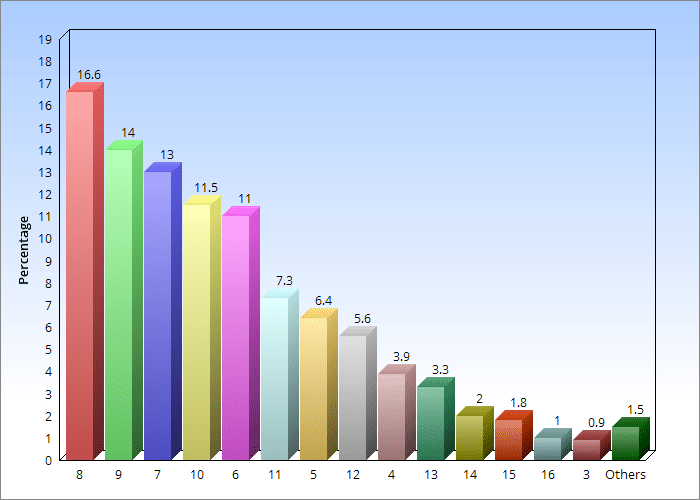
| Number Of Characters | Percentage | Number Of Startups |
| 8 | 16.6 | 353 |
| 9 | 14 | 298 |
| 7 | 13 | 280 |
| 10 | 11.5 | 245 |
| 6 | 11 | 234 |
| 11 | 7.3 | 156 |
| 5 | 6.4 | 137 |
| 12 | 5.6 | 120 |
| 4 | 3.9 | 82 |
| 13 | 3.3 | 71 |
| 14 | 2 | 43 |
| 15 | 1.8 | 39 |
| 16 | 1 | 20 |
| 3 | 0.9 | 18 |
| Others | 1.5 | 42 |
79.8% (1703) of the startups use a domain name between 5-11 characters! 16.6% (or 353 startups) use a domain with 8 characters and 14% (298) use a domain with 9 characters. 13% (280) chose a domain with 7 characters.
If you are not interested only for startups you can read my previous post that has more generic stats and it includes all kinds of sites, not only startups. Here is the post How Long is Too Long For A Domain.
Hyphen or Not In The Domain Name
Many people are thinking to add a hyphen/dash(-) when they can’t secure the desired domain. It seems that the big majority of the startups choose not to use that technique. In my opinion, having a dash in your domain can confuse your clients and lead them to type the version without the dash.
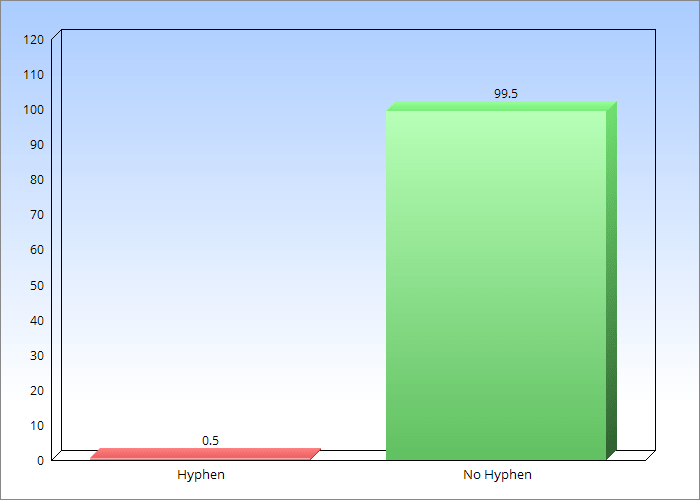
Less than 1% (0.5) of startups use a hyphen in their domain. Let’s check 2 real examples: Carrot Fertility is a company that uses a domain with hyphen get-carrot.com. The Atlas is an online community for local government officials and they use the domain the-atlas.com.
Numbers in A Domain or Not
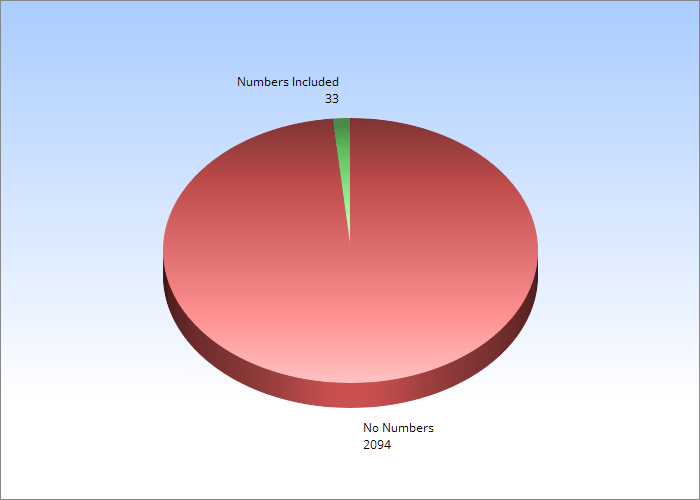
The big majority of startups (2094) avoid adding numbers in their domain. Only 33 startups choose to add some numbers. Sometimes it makes sense to include numbers in your domain.
Here are some examples:
TrueCare24 (truecare24.com) is an on-demand care platform and 24 emphasizes that it is available 24 hours per day (meaning all day). 3dlook (3dlook.me) is a mobile scanning solution for e-commerce companies. The “3” comes from 3d scanning so it makes sense in that case.
Popular Domain Endings
I already mentioned suffixes earlier but now I will explore mostly the endings/suffixes that are added for the sound they give to a word. I noticed some patterns for 255 startups out of 2127 from the original sample. So, what kind of suffix some startups add to the invented words to make them sound more catchy?

| Domain Ending/Suffix | Number Of Startups |
| er | 89 |
| ly | 37 |
| it | 26 |
| able | 17 |
| ro | 17 |
| ic | 15 |
| io | 14 |
| iq | 11 |
| to | 8 |
| fy | 8 |
| ra | 8 |
| sy | 5 |
I also checked some additional domain endings/suffixes to find out what is the most popular one. The domain ending/suffix -er is by far the most popular with 89 startups using it against 37 that use- ly. The number 3 choice is -it with 26 startups using it.
Here are some examples:
Buxfer (buxfer.com) is an application for managing your money. Realiteer (realiteer.com) develops software using VR and AR. Recurly (recurly.com) helps brands accepting subscriptions. Remoov (remoovit.com) helps people and businesses to sell or donated their unwanted stuff.
Final Words
I hope the post helped with your naming decision and you learned some interesting things. Don’t forget to share on social media and spread the word for that in-depth analysis!